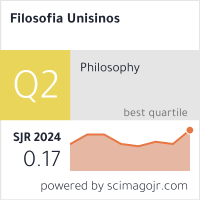Nature-Life continuity: is there a necessary method of inquiry?
DOI:
https://doi.org/10.4013/fsu.2021.221.12Resumen
In Linguistic Bodies, Ezequiel A. Di Paolo, Elena Clare Cuffari and Hanne De Jaegher (2018) propose a dialectic method to explain organism’s movements and exchanges, i.e., life inter-actions and evolution, that can also explain the evolution from life to cultural relations, that include linguistic interactions. One of the main questions Linguistic Bodies wants to answer is how to explain human life and culture without a reductive scientific thought. If one defies radical reductionism, one of the central risks is to dissociate physical inquiries from biological investigations. In the book, the authors oppose the analytical mode of thinking present in many natural sciences to a dialectical mode of thinking that would explain living beings’ interactions. It is relevant to question if they succeeded in defending the dialectical model they profess to be the best suited to explain human social phenomena. Following this line of rationale, in this paper, I will, first, show that dialectical methods are over-ambitious and, second, inquire into the anti-reductionist attitude present in the dialectical model advocated in Linguistic Bodies.
Key-words: Linguistic bodies, radical reductionism, dialectical model.
Descargas
Métricas
Descargas
Publicado
Cómo citar
Número
Sección
Licencia
Concedo a revista Filosofia Unisinos – Unisinos Journal of Philosophy o direito de primeira publicação da versão revisada do meu artigo, licenciado sob a Licença Creative Commons Attribution 4.0 (que permite o compartilhamento do trabalho com reconhecimento da autoria e publicação inicial nesta revista).
Afirmo ainda que meu artigo não está sendo submetido a outra publicação e não foi publicado na íntegra em outro periódico e assumo total responsabilidade por sua originalidade, podendo incidir sobre mim eventuais encargos decorrentes de reivindicação, por parte de terceiros, em relação à autoria do mesmo.











